by Aurelio Muzaurieta | Sep 22, 2022
“Study abroad” isn’t something most students can say they did in medical school. This summer I had the opportunity to rotate in Brazil entirely in Portuguese to bolster my language skills and cultural humility to serve Portuguese-speaking patients. This experience was part of my broader goal to serve patients in their preferred language and to build an impactful career in global health.
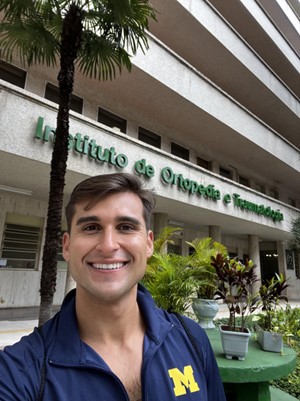
At the entrance of the Orthopaedics and Traumatology Institute, affiliate of the Hospital das Clínicas and University of São Paulo School of Medicine.
It has been estimated that more than 25 million people in the United States have limited English proficiency and regularly struggle to communicate with their health care providers. As the United States becomes more linguistically diverse, our health care system must continue to adapt to serve the country.
The desire to serve patients with limited English proficiency is one of my strongest motivators for entering the medical profession. I grew up in a bilingual household where my grandmother, who immigrated from Cuba and never felt confident in English, always felt uncomfortable seeing physicians who did not speak Spanish. The fact that mastery of a patient’s preferred language not only improves clinical efficiency and quality of care but also enriches the patient-physician relationship has inspired me to study world languages and global health care systems.
As an undergraduate at Harvard, more than half of my courses were in foreign languages: Spanish, French, Portuguese or Mandarin Chinese. I took literature and history courses about the lands where these languages are spoken alongside organic chemistry, biology and physics with the hope of one day bringing them together in service to patients. I volunteered as a multilingual interpreter at Massachusetts General Hospital and spent a summer researching the Zika Virus in Brazil during the 2016 Olympic games. I spent time at clinics, shelters and food banks in the Boston-area that served predominantly Portuguese-speaking communities. Not only did these include Brazilians, but also immigrants from rural Portugal, Cape Verde, Angola, Mozambique, and São Tomé and Príncipe. After graduation, I pursued a master’s degree in health economics and management at Peking University in Beijing and wrote a thesis comparing health care systems in America, China and the U.K. My goal in these endeavors abroad was to evaluate the physician and patient experience in diverse health care delivery ecosystems.
When applying to medical school, the opportunity to develop clinical skills in a multilingual context and to pursue global health was a top priority and one of the main reasons I decided to attend University of Michigan Medical School. Not only does our school offer programming in Medical Spanish, Chinese and French, but as a clinical student I applied this skill set in real patient care, especially in the emergency department, primary care clinics, and the Labor and Delivery service during the OB/GYN rotation. Moreover, Michigan’s accelerated pre-clinical phase opens our third and fourth years (called the “Branches”) to customizable clinical, research and entrepreneurial opportunities that are rare at other medical schools. Global REACH, Michigan Medicine’s international office, provides unparalleled administrative and financial support for medical students dedicated to projects pursuing global health equity.
Thanks to the support of Global REACH’s Dr. Joseph Kolars, Dr. Denise Tate and Tania Piotrowski; U-M Orthopedic Surgery Department’s Dr. Jaimo Ahn, Dr. David Walton and Dr. Eileen Crawford; and University of São Paulo’s School of Medicine’s Dr. Júlia D’Andrea Greve and Dr. Linamara Rizzo Battistella, I designed a four-week clinical program in comprehensive musculoskeletal medicine and orthopaedic surgery in São Paulo, Brazil at the Hospital das Clínicas, the largest hospital system in the Western Hemisphere and affiliate of the University of São Paulo School of Medicine (FMUSP).
During my rotation in Brazil, I rotated through operating rooms, inpatient floors and outpatient clinics, including orthopaedic trauma, sports orthopaedics, spinal cord injury, traumatic brain injury and amputations. I also had contact with emergency rooms and primary care clinics to broaden my exposure to the Brazilian health care system as a whole. Rotating in a city as large and dense as São Paulo offers a wide range of clinical scenarios unlikely to be seen in Michigan or even in the United States! For example, one patient presented with cervical spine trauma after a jackfruit – a tropical fruit weighing up to 80lbs – fell from a tree and struck his head while he was strolling on the sidewalk. Culture plays a significant role in medicine as well. Given sport, music and dance are salient features of Brazilian society, clinical research often explores topics in soccer, volleyball, footvolley, Futsal and samba.
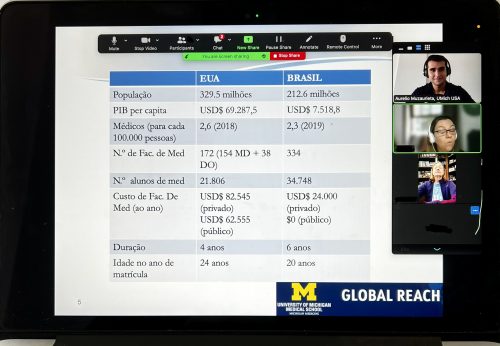
Delivering a virtual presentation in Portuguese on the American Medical Education System to medical students, residents, faculty and researchers at the University of São Paulo Medical School.
My rotation in São Paulo also exposed me to how medicine is studied and practiced in Brazil. Learning about the Brazilian medical education system made me reflect on my educational experience at Michigan and the American system more broadly. At the end of my rotation, I gave a presentation in Portuguese to medical students, residents, attending physicians and researchers about American medical education. We exchanged so many interesting ideas and insights that we decided to build a formal program to connect our institutions at the trainee and faculty level to give continuity to these valuable conversations.
For me, medical school is about becoming the best doctor we can for our future patients. The opportunity to combine the clinical skill set I am learning at Michigan with my Portuguese language skills to care for patients in Brazil was by far the most impactful experience I have had during medical school. Not only did the experience improve my medical Portuguese, but I also feel more nimble navigating new clinical and administrative environments and better equipped to serve patients in high-volume settings. Additionally, given the stark differences in health care infrastructure, building bridges between American and Brazilian medical institutions offers the opportunity to share insights about best clinical practices and systemic design. Rotating at the University of São Paulo motivated me to continue mastering the skills necessary to serve vulnerable patients and to build on my career goals in health care delivery optimization.
I am so grateful for my mentors at the University of Michigan and University of São Paulo who support my academic and professional pursuits. When we say “Go Blue” it truly is a statement of family and community that spans across the globe. I am proud to be a Michigan Wolverine.
I am more than happy to speak with prospective or current students about Michigan. Please do not hesitate to reach out on LinkedIn, Instagram or Twitter!
by University of Michigan Medical Students | Sep 7, 2022
The University of Michigan Medical School’s first “Get to Know Blue” Interview Experience is just around the corner on September 15th.
For those of you with medical school interviews scheduled — and those who hope to have interviews scheduled soon — last year’s incoming class of Michigan med students had put together their best advice for making this day a success for you, too.
Topics range from how to set yourself apart and deciding where to interview to the do’s and don’ts of virtual interviews, getting the inside scoop from current students, and even some bonus tips.
On how best to convey what sets you apart on the spot (or on camera):
- “Oftentimes the things that set you apart don’t have to do with your academic qualifications, but rather your real life and work experiences, and even your hobbies!” -Matthew
- “Have a list of anecdotal examples that highlight who you are and incorporate them into the conversation because they will only learn what you tell them about yourself, so share a lot!” -Gabriela
- “Be yourself, be humble, and be confident. Those three things will give the admissions committee good insight on what makes you unique.” -Miles
- “Just tell your story and be honest. When I messed up on interviews, it was usually because I was trying too hard to tell the interviewer what I thought they wanted to hear.” -Matt
- “Know your story inside out, knowing your unique journey and being able to explain why that story has led you to medicine will automatically set you apart because no one else has your story!” -Navjit
- “Be yourself, stay calm, and don’t worry or feel intimidated by the virtual nature of the interview. The committee is interviewing you not to grill you, but rather because they are super excited to learn more about you!” -Husain
- “You are much more interesting and unique than you may think you are, and if you speak about your true passions, it will come across as genuine.” -Chloe
- “Remember you’re talking to a PERSON not a screen. It can be easy to get stiff on camera but it’s important to relax and be organic.” -Lindsey
- “Invest your time to really understand why you chose medicine and what makes you want to pursue it so much, where your passion for medicine came from and what maintained that interest all this time to continue pursuing it. This will also help you keep your perseverance through medical school.” -Aasma
- “It is hard to convey emotion over a camera but I tried to keep eye contact and just convey that I was truly happy to be part of the interview process. Try your best to just have a normal conversation! You are already halfway there by making it to the interview.” -Hiba
- “Leaning into your passions in an interview and throughout your written application ought to be enough to showcase your awesome-ness to the school that is right for you.” -Lindsay
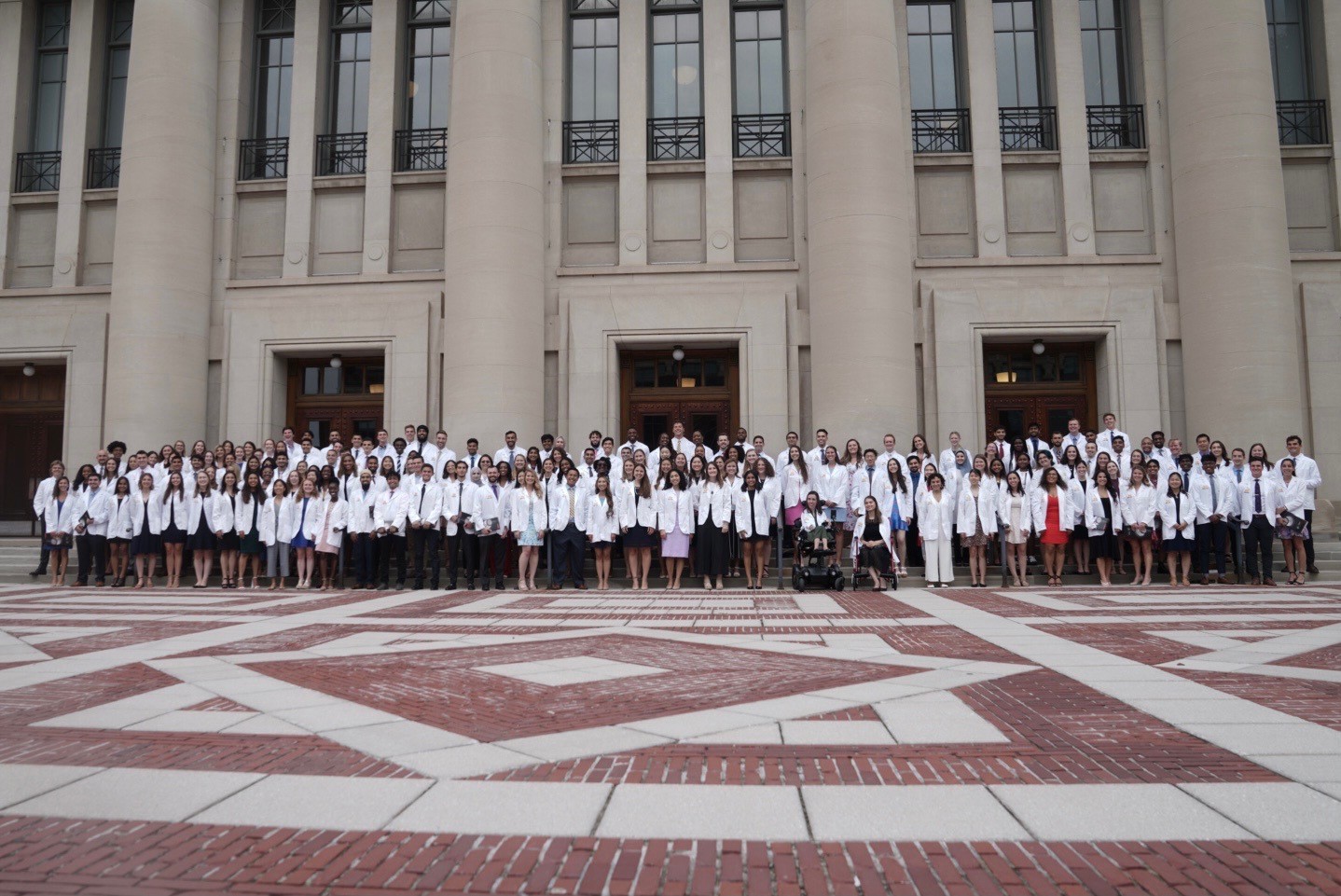
The White Coat Ceremony for the incoming Class of 2021
On deciding where to interview, especially when travel costs aren’t a consideration:
- “Don’t undersell yourself when applying, if you think you have a chance, take it!” -Niki
- “Interview everywhere possible when travel costs aren’t a consideration. You don’t know how much you may like a school if you don’t choose to even interview and take the chance to explore its culture and environment.” -Aasma
- “I really enjoyed the interview process. It was the first time I felt like people were seeing Sarah the person versus Sarah the numbers on a page. I got to be myself and that is even more available when there are remote interviews.” -Sarah
- “Make sure the school you are interviewing at has resources in what you want to do (very important).” -Bruce
- “Talk to other students or other applicants, if available. Culture is #1. The people who the school recruits say the most about their culture.” -Matt
- “Do your research! You owe it to yourself and the schools interviewing you to make sure that you have spoken with students and faculty about the institution and the experience at their medical school.” -Ashwin
- “Make sure you’re interviewing at schools that FIT you.” -Patrick
“Interview at schools with significant financial aid and/or scholarships. Cost of attendance will be an important consideration when you decide which school to attend.” -Tosin
- “You want to attend an institution that will nurture your passion and develop it into a craft.” -Hebah
- “Notify a school early on if you aren’t considering their school anymore to save interviewers, schools, and other applicants time. Be sure to take advantage of your opportunities while still respecting others in the process.” -Sydney
- “When researching for the interview, I always asked myself if I was excited to learn more about the school or if there was something in particular I was excited about. If not, then I would decide not to interview at the school.” -Hiab
- “You should see every offer as if it is your potential home for the next four years.” -Mohammed
- “If you truly cannot see yourself thriving in the city or your goals for medical school do not align with the mission of the school, do not interview!” -Emily
- “Interview at the places you feel excited about attending! It makes preparing for the interviews enjoyable and your excitement day-of will be genuine.” -Cara
- “Go into the interview open-minded. You never know how much you could see yourself at a specific program if you do not give yourself the opportunity to immerse yourself within the school’s culture.” -Amy
Do’s and don’ts for preparing for and thriving during virtual interviews:
DO’S
Find a Great Place to Set Up
- “Preparing my background and the space where I did virtual interviews really helped me feel prepared.” -Rachel
- “Stay in the same environment for each medical school interview if possible, which will help you remember your anecdotes and release nerves.” -Ashwin
- “Choose a comfortable spot. For me, interviewing from a familiar desk at home improved my performance rather than interviewing from a new location.” -Navjit
- “Investing in a mini ring light if you can afford it can be helpful if you are in a setting with bad or variable lighting, it just looks professional.” -Juliana
- “Use a study/conference room somewhere if you can (work, school, etc.). This helped me move from my home to a more professional setting and got my nerves up a little so I could have an edge while interviewing.” -Sarah
- “Set up your camera to be in good front lighting and put it on a RAISED platform! Having a camera angle pointed straight at your face or even pointed down toward your face makes you look more engaged and is a better angle for aesthetics as well.” -Jayna
- “Give your living-mates ample notice and reminders about your interview days so they can plan ahead about supporting you by keeping the home relatively quiet.” -Lindsay
Dress the Part
- “Wear both a dressy top and bottoms to avoid awkwardness if you need to stand up.” -Josh
- “Wear cozy socks/slippers! A silly tip, but a perk of virtual interviewing that helped me feel much more comfortable during an otherwise stressful situation.” -Anjali
Make Eye Contact
- “Put a picture you like to look at right next to your camera. It made it really easy to look directly at it, even when I was nervous.” -Sarah
- “Looking at the camera isn’t needed if the camera is right above your screen – instead just sit a bit farther away.” -Pratik
- “Virtual eye contact is achieved much more effectively if you look into the computer camera rather than the eyes of the person on screen. It is a little weird to get used to, but you do get used to it!” -Olivia
- “You have to really engage with your interviewer. They don’t have any physical cues and body language is harder to read, so acting interested and really being an active listener is important.” -Mary
Prepare for Potential Tech Issues
- “Prepare for the worst with respect to technology, and be adaptable if something goes wrong.” -Bruce
- “Establish a stable internet connection beforehand and make sure it is steady.” -Sagar
- “Have an ethernet cable nearby in case you need it, and a phone that can be a mobile hotspot if the wifi is bad that day. I ended up using both at some point.” -Lindsey
Practice, Practice, Practice
- “The flow of conversation is simply different. Due to the lag, you may cut someone off or vice versa, this takes some practice and compassion.” -Jasdeep
- “Thoroughly read your application beforehand and learn the format of the interview (1:1 with faculty, MMI, group activity, etc).” -Tosin
- “Google potential questions and do mock interviews with them over and over.” -Noah
- “Use your computer to record yourself answering interview questions and use that to gauge your eye contact, facial expressions, and fluidity of speech (speed, use of “um,” etc.).” -Chloe
- “Always pause and take a breath before answering the question, you don’t want to start talking as soon as the interviewer finishes asking the question.” -Mohammed
- “Take a video of yourself in the setting and outfit you plan to wear for the interview, ask a friend or family member to conduct a practice Zoom with you! This will help you ensure internet connection and Zoom background are updated.” -Emily
Take Breaks
- “Try to take advantage of all breaks possible, Zoom fatigue is very real.” -Hiab
- “HAVE A DANCE PARTY BETWEEN INTERVIEWS! During my interview day I turned on music and my group danced! It was fun and shocked the nerves right out.” -Sarah
- “I would walk around whenever there were breaks because sitting down for that long can be very difficult.” -Hiba
Bring Refreshments
- “Keep yourself hydrated throughout the day to help you reset between interviews.” -Jasdeep
- “I kept small snacks, water, and tea handy, so that I would be able to sneak in a few bites here and there during long Zoom interviews.” -Erin
DON’TS
Don’t Sweat the Tech Issues
- “Don’t panic. The issue will be resolved, and you don’t want to be flustered in your interview.” -Matthew
- “Don’t worry if a technical issue occurs that causes a lag or signs you out of the call. The admissions team are incredibly helpful and they’ll make sure your interview process is as smooth as possible (one of the defining features of my UMMS interview, an incredibly smooth and enjoyable process)!” -Hebah
- “Most importantly: relax and be you. Even if you feel like one part didn’t go well or you are having tech issues, take a deep breath and start fresh. Contact the person you are told to contact when you are having issues and know everything will work out just fine.” -Aasma
- “If you experience a connectivity problem, treat it as a chance to show your interviewer that you can competently handle a difficult or awkward situation.” -Ahab
More Don’ts
- “Don’t hesitate to ask your interviewer to restate a question.” -Jorge
- “Don’t be the person who’s grossly underdressed on interview day or constantly interrupting others (leave room for others to speak).” -Mikaelah
- “Don’t swivel in a spinning office chair. To remove the temptation, I replaced my desk chair with a chair from my kitchen table.” -Jess
- “Don’t spend too much time looking at your own video – it’s distracting! Focus on the videos of the people interviewing you – this simulates a more normal conversation :)” -Cara
- “Don’t forget to smile and breathe! (it is virtual, but I know I still felt very anxious and had to keep reminding myself)
- “Don’t forget to pause at times! With potential delays in the feed, it may take a few moments for one person to stop talking and another to start speaking. This is especially true in group interviews as gaps are needed as a queue for another to start speaking.” -Tyler
- “Don’t look down at notes or at another screen during the interview. While it may be helpful to have notes on hand to remember things you want to mention during the interview, make sure to put them out of sight prior to the interview. The conversation should be natural.” -Amy
On getting the inside scoop from current students at the schools you’re interested in before/during/after you interview:
- “In the virtual format, every perspective matters. Pay special attention to what and how current students talk about their school. If the same complaint keeps showing up, that is probably a red flag.” -Matt
- “I can’t stress enough the importance of sending a few emails ahead of sending your secondaries and during the interview process.” -Ashwin
- “Follow schools’ Twitter and Facebook pages to find opportunities to talk to current students!” -Navjit
- “Almost everyone is very willing to offer advice, they were in the same situation a few short years earlier.” -Mary
- “Seeing whether the students seem relaxed and enthusiastic in answering our questions or hosting the info sessions can also show what type of learning environment and culture the school has. Med school is tough anywhere, but if the students seem happy and relaxed despite the pressure, that’s fantastic.” -Aasma
- “Don’t be afraid to be candid with the students, such as making them know what you are specifically looking for in a school.” -Josh
- “Always ask questions. If in a student-led pre-interview session, have the courage to unmute your microphone and talk to them; that’s what they’re taking time out of their busy schedules to help you with!!” -Mohammed
- “If the school offers an opportunity for you to talk to current students anytime in the interview season, tune in! You don’t have to participate at every one or any, but I found listening in at the very least to be helpful. Seeing how current students interact (their fondness for each other / inside jokes) with each other was reassuring.” -Lindsay
- “Go in with a list of questions around topics/aspects you care deeply about and ask at every school to multiple people if possible. This will give you good points of consensus (or not) within a school and comparison between them.” -Andrea
Bonus tips on the overall application process:
- “It can be very easy to be self-deprecating and compare yourself to others during this process, but surrounding yourself with your supporters can truly make the stress of the application process bearable.” -Amy
- “Enjoy the process, it’s a big step but it’s full of learning experiences and great memories!” -Niki
- “Remember, you are interviewing schools just as much as they are interviewing you!” -Tyler
- “The interview process is the only time an applicant can come alive from a statistic or a piece of paper. Don’t be afraid to vocalize your passion, value, and drive that will distinguish you as a unique asset to the specific medical school and, largely, the field of medicine.” -Erin
- “If you know your interviewer’s name ahead of time, do a bit of research. It was helpful to me to look at a picture of the individual beforehand, so their face was more familiar to me when we were introduced on zoom. It eased my nerves to see a familiar face!” -Cara
- “Be patient!” -Emily
- “When completing an application, answering an essay, or getting interviewed, always be honest and be yourself, that is the one way to get yourself accepted to medical school.” -Mohammed
- “Always stay true to who you are. Trust the process. Remember that everything isn’t always in your control and make the most of the opportunities that present themselves to you.” -Sydney
- “Don’t compromise your happiness. Make sure where you attend you can see yourself being happy, and your interests being valued.” -Aasma
- “See each application and interview as a learning process through which you grow and become even more confident in your capabilities. By the end of it, you’re one step closer to becoming the physician of your dreams. Simply enjoy it.” -Hebah
- “Don’t be afraid to ask for help and advice! Your support system of advisors, family, and/or friends can relieve some of the worries associated with applying to medical school and provide useful feedback.” -Chloe
- “The application process can be daunting, but I think it is really important that you take a step back and look at all that you have done to get to this point. It is truly amazing! No matter how the cycle goes, you can be proud of yourself.” -Olivia
- “Overall, be patient and kind to yourself during the application process. It will feel overwhelming at times, but know that there are people you will encounter along the way who can help you.” -Tosin
- “Don’t ever give up throughout this process. It can be difficult and grueling. I ended up reapplying to medical school after not being accepted my first cycle. I used this additional year to grow, better reflect on my application and have conversations with medical schools across the country. Believe in yourself and keep pushing!” -Ashwin
- “Be genuine! The best thing you can do is present your authentic self. If you’re accepted, you’ll know that the school wanted the authentic you. If you don’t, you shouldn’t have regrets.” -Jasdeep
Good Luck and Go Blue!
by Charlie Ferreri | Aug 19, 2022
The Olympic Games are considered some of the most anticipated sporting events in the world, rotating between winter and summer sports every four years in some of the most culturally rich locations. Arguably just as exciting, Surgery Olympics is an academically stimulating event that occurs yearly in one of the best cities, Ann Arbor, Michigan.
In my experience, Surgery Olympics has introduced me to the concept of developing and executing original research projects and has connected me with dedicated mentors, all while having fun with classmates along the way. It has been such an important milestone in my medical school experience and is a program that both students and faculty look forward to every year.
An important concept of academic research and medicine is lifelong learning. There are always new knowledge and methods to be learned with the common goal of improving outcomes for patients. That’s one of the great things about Surgery Olympics: whether a student is starting at square one or has already learned how to construct and publish a vast portfolio of research, this program offers something for everyone.
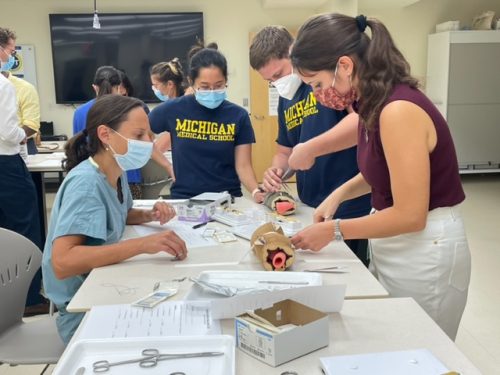
Surgery Olympics offers incredible opportunities for hands-on experience
Coming into medical school, I had some research experience in a surgical laboratory, but I wanted to learn more about the process of academic writing and how someone can take a novel idea and turn this into work that the community views as valuable. The best place for me to learn this was through Surgery Olympics.
What is Surgery Olympics?
It’s a longitudinal program put on by SCRUBS, which is an interest group that aims to provide mentorship for medical students who are interested in surgery. This initiative is supported by the Department of Surgery and provides students with networking and mentorship with faculty, research and technical skill development, opportunities to bond with fellow classmates and much more.
Does one have to declare that they want to go into Surgery before they can participate in Surgery Olympics?
No! The program typically occurs in the spring/summer of the scientific trunk (M1 year). For many medical students that stage is still too early to know what specialty one might apply into, with lots of soul searching and discovery ahead on the horizon.
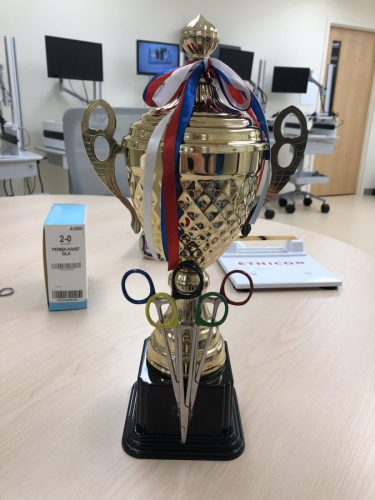
This coveted trophy is sought after by Surgical Olympians from the med student to attending level each year.
This is a longitudinal program that lasts the entire summer and is intentionally offered to students after their first year. Students are divided in groups of three to four along with an M4 coach and an attending of a specific subspecialty who serve as mentors. In the past, there has been representation from General Surgery, Minimally Invasive Surgery, Pediatric Surgery, Vascular, Thoracic, Colorectal, Surgical Oncology, Plastics, Hepatobiliary and Advanced GI, Endocrine, Transplant, Urology and many more.
Students typically meet every two weeks over a 14-week period to keep on track with their project. At the very end of the program, students have an opportunity to present their work at the Department of Surgery Grand Rounds. In keeping with the name, there is also a final competition that serves as an opportunity for students to show off the knot tying, suturing and other technical skills they have learned. The winning team gets to take home the prized trophy along with its associated bragging rights.
Other than the fun and games listed above, there are presentations and talks throughout the program delivered by faculty or residents, which I personally found very helpful. Talks could be clinically based or even discuss health and wellness during residency. I also appreciated that the timeline afforded me opportunities to regularly check in with my teammates and mentors. It kept me grounded, focused and excited to keep pushing our project forward.
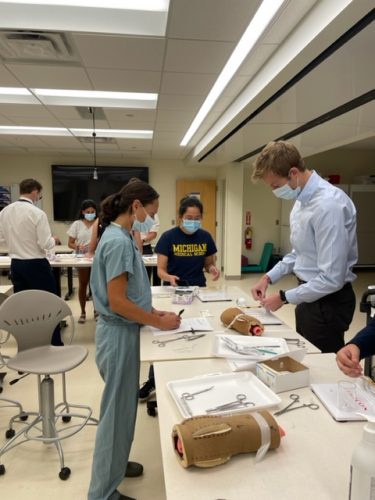
Michigan medical students learning technical skills that will help them prepare for the annual competition.
I felt compelled to share my reflections on Surgery Olympics because it has been one of the most helpful experiences in my medical school journey. I was placed on the Urology team as an M1, and now I will be applying into that very field. I was extremely fortunate enough to be connected with my mentor, Dr. Kate Kraft, through Surgery Olympics. She has been a constant source of guidance and support throughout my four years at Michigan. It would be hard to imagine my medical school experience without our regular check-in meetings and being able to share my highs and lows with her.
One of the incredible things about the faculty participation is just how excited they are to welcome students onto their research teams and to teach them more about their respective field. It’s important to note that faculty at Michigan Medicine view mentorship as a two-way street, and they gain just as much from mentoring students.
“Surgery Olympics provides a chance for surgical faculty to introduce students to their specialty early in medical school, creating an enriching mentorship opportunity. We’ve been extremely fortunate to have a number of Surgery Olympics students pursue urology as a career – and urology is much better for having them in the field!” – Dr. Kate Kraft
In fact, I think the commitment to mentorship that faculty at Michigan Medicine demonstrate is something that sets this institution apart from all the rest. No matter what field your interests lead you toward, Michigan Medicine is composed of so many powerhouse leaders who want to help you discover your path to your future career in medicine. It can be daunting to make such a big decision, but it is one that we all have to make, and the support along the way has been invaluable. For this reason alone, I am so thankful I took part in Surgery Olympics. As I’ve shared above, the faculty at this incredible institution are so passionate; but don’t just take my word for it, read more from them:
“Surgery Olympics is one of my favorite annual events. It’s the first interaction many of our M1 students will ever have with a surgical faculty. This offers a unique opportunity to not only teach a couple of technical skills and work collectively on a research project, but more importantly a chance to debunk some of the circulating myths about surgeons. It’s a chance to share our own ‘origin stories’ and what fuels our passions, in hopes that it would inspire a young student as they begin their own journey. In return, I am constantly awed by the creative solutions my students come up with to sometimes challenging problems and how they push me to higher levels of empathy and social justice. I’m a better surgeon because of the work I get to do with my students!” – Dr. Gifty Kwakye
Dr. Kwakye is our very own clerkship director for the M2 Surgery and Applied Sciences rotation. Her work and dedication to medical student education speaks for itself, and her passion and positive demeanor inspires students to learn more about the incredible field of surgery. I have early memories of my surgery rotation where I was initially nervous about learning in the OR environment; however, after routinely bumping into Dr. Kwakye in the pre-op area and exchanging a friendly wave or a brief conversation about our days, I felt ready to take on the day’s cases.
In reflecting on my Surgery Olympics experience, I interviewed the Department Chair of Surgery, Dr. Justin Dimick. I asked him what he thinks the importance of this program has on a student’s education and trajectory:
“Academic surgery is about using the scientific process to improve our profession. At Michigan, we strive to pursue a diverse portfolio of scientific discovery, including basic science, education, clinical trials, health systems, organizational culture, and more. The SCRUBS program is intentionally designed to involve medical students in conducting research in one of these areas. For students, this will allow them to start to envision their own career trajectory in academic surgery, where they craft a path to being excellent clinicians and also begin to think about how they might pursue scientific discovery to improve the field of surgery in some way.” – Dr. Justin Dimick
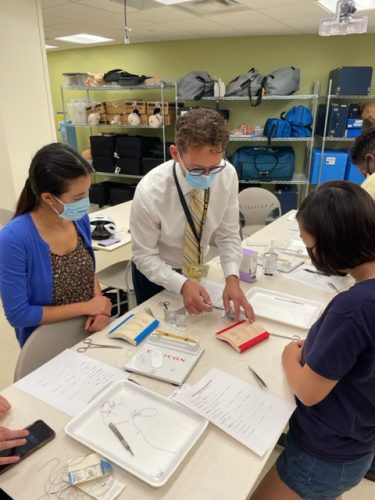
These events also help students hone skills that will prepare them for their surgery, OBGYN, EM and other rotations.
I believe this answer reiterates to just how committed the faculty are in improving the outcomes of medical students as they discover their own path to becoming the best physician they can be.
How can one learn more about SCRUBS?
If you are interested in learning more about SCRUBS and the other opportunities offered by the program, please consider following SCRUBS on Twitter, visiting the homepage or contacting the leadership team by email.
Current SCRUBS Leadership:
Class of 2023: Cameron Harter, Aurelie Tran, Davis Argersinger, Lauren Hoff
Class of 2024: Ally Grossman, Tianyi Wang
Class of 2025: Kailyn Koh, Emily Roney
SCRUBS Directors: Dr. Paige Meyers, Dr. Seth Waits
Connect with faculty on Twitter: Dr. Kate Kraft, Dr. Gifty Kwakye and Dr. Justin Dimick.
by Nikki Trupiano | Aug 11, 2022
As a high schooler, I was involved in a life-threatening motor vehicle crash. I had a team of a variety of health care professionals who brought my life back into this world and truly are the reason I recovered as well as I did. Though I did not know it at the time, that experience would have as big an impact on my professional life as my personal life.
Prior to medical school, I worked on an interdisciplinary team in a primary care clinic where I saw first-hand from the provider perspective how much interprofessional work can improve patient care. I knew when I came to medical school that I wanted to find a place that would not only support my passion for interprofessional education (IPE), but also work to ensure that all the trainees left the program with the same open mindset and desire to work with other health professionals. I found that at Michigan.
From the beginning of my medical school experience, I embarked on a journey to work with the faculty at Michigan to ensure an incredible IPE experience for all.
I started serving as the IPE representative on student council for my medical school class. There, I had the opportunity to work closely alongside Dr. Bishop, the Director of IPE at University of Michigan Medical School. From the beginning, he was so incredibly receptive to all student feedback. Not only did he care about my success with IPE, but he also cared about me as a person and never missed a moment to ask how I was doing. We even got lunch one day when I was on a rotation in his clinic. I knew that any time I needed something, he would drop everything to be there for me. This is not unique to Dr. Bishop but is present through Michigan Medicine.
As the IPE representative, I also got the chance to work Carrie Braun, the IPE Program Manager. She offered an immense knowledge from years of medical education and an unmatched excitement about working with students. She, too, always checked in on me and asked what she could do to help.
Dr. Bishop and Carrie are never content with being “great;” they strive for excellence in the support and education that they provide to the medical students. We worked as a team to help revamp some of the IPE courses offered to the medical school based directly on student feedback. We then crafted a novel idea to track the “real-life” interprofessional experiences of medical students during their clinical rotations. The results were incredible; so much amazing IPE took place throughout the hospital daily. We went on to interview several health professionals about how medical students can best work with them and advise on how students could do well in the clinical rotation for their specific department. The videos were edited and provided to the students prior to starting their clinical rotations and received positive feedback. To our knowledge, no other medical school offers that type of introduction to the clinical rotation as part of their curriculum. Initially I thought the idea was unattainable, but Dr. Bishop and Carrie were determined to turn my concept into reality.
In addition to my partnerships with Dr. Bishop and Carrie, I also helped to mentor the medical students in classes below mine on how to become involved in IPE and the importance of IPE in clinical care.
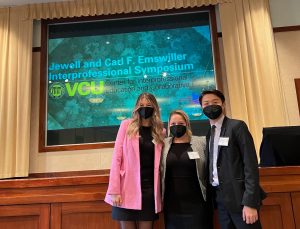
Presenting our work at a national conference in Virginia with my fellow co-chairs!
I also became a co-chair for the Student Advisory Committee (SAC) at U-M, which is a committee run entirely by students and housed under the Center for IPE (C-IPE). The SAC unites students across the U-M health professional schools to promote and engage students in IPE, with a goal of ensuring that graduates will be prepared to work in interprofessional environments upon leaving the university. Through SAC, I met two of my best friends who are dental students. I’ve learned so much about how to be a better health care provider from collaborating with them and hearing all the different perspectives from various health professional students. The university even funded us to travel around the country presenting our work as a student-led initiative at national conferences.
Through SAC, I also had the opportunity to sit on executive committee for C-IPE. I met faculty from all the different schools and was invited to join one of their curricular planning teams. Together, we created a new experiential IPE course featuring real patients from the Office of Patient Experience at Michigan Medicine called the Longitudinal Interprofessional Family Based Experience (LIFE), where students from a variety of health professional schools were put into teams to learn about their patients’ experiences with chronic disease and the impact of the social determinants of health. I had the opportunity to publish and present this innovative work across the country.
These C-IPE workgroups are on the cutting edge of the most novel IPE strategies. C-IPE has gone above and beyond to find creative ways to incorporate my voice as a student in the workgroups. They have never wavered in having a student join their team – in fact, they crave student input. Everyone at Michigan does their work in the name of the students and takes the time to listen to feedback. It has truly been a life-changing experience to be so supported and valued as a student. Combined with the excellence and training of the faculty, the high standard for research and scholarship and the drive to continue improving, the Center is poised to continue being an international leader in paving the way for IPE.
My experiences with C-IPE have helped me to develop numerous personal and professional skills. I have learned how to communicate better and make others feel like an important part of the team. I have confirmed the benefit of gathering different perspectives and relying on your teammates’ strengths. I have gained numerous tangible skills to improve my research and writing. I have made friends for life. I have confirmed the beauty of being part of a community here at Michigan that values your opinion and makes you feel heard. The list goes on and on, but I know that all these skills will only make me a better doctor and a better colleague on future care teams. I am so thankful that Michigan has supported me in following my passions and provided these incredible opportunities for development.
by Christian Mackey | Jun 1, 2022
If you haven’t heard it before, climate change is being described as the greatest public health threat of this century. It is the topic of large international meetings, like last year’s COP26, where country leaders discussed carbon goals and made numerous commitments for cameras and newsstands. The topic is increasingly featured in political debates and in media where national conversations about our priorities as a country are held. Locally, Ann Arbor is investing in the A2Zero campaign to achieve carbon neutrality in the city.
We are, however, doing an insufficient amount to address the threat adequately. Oil investments are still being made, carbon taxes are being stalled in legislation, and investment in sustainable energy and waste management is slow. The medical system itself is a major contributor to the problem with its massive energy costs and production of physical waste. For these reasons, individuals in the medical sphere have to push for practices that may help curb the inevitable changes in climate ahead of us.
Another reason it is important for medical professionals to care about climate change is that we have a lot to contribute by looking at the issue in the ways we contemplate issues in human health. The prevention framework from the world of public health, I believe, can be applied to climate change in an unfortunately tidy way; we’re past the point of primary prevention (preventing climate change entirely), we’re failing at methods of secondary prevention (making interventions to reduce the speed of climate change) and we’re not unified in how to perform tertiary prevention (managing climate change in the long-term and the harms it is already causing).
In primary care you work with patients on health concerns that rarely have a simple fix, where numerous small actions accumulate into poor outcomes, and where there is distance between the timing of the health insult and health outcome. These are the same kinds of barriers that get in the way of making meaningful changes in the way of climate change.
In the way that stopping smoking is a difficult but assured way to improve one’s future health, our emissions and waste production today make life easier even if the consequences in 20 years will be life altering (on a global scale). However, we don’t have to wait 20 more years to see effects, we’re already seeing the results of climate change here in Michigan in the ways of increased frequency of extreme weather events, threats to food security and the expansion of the geographic ranges of vector-borne diseases.
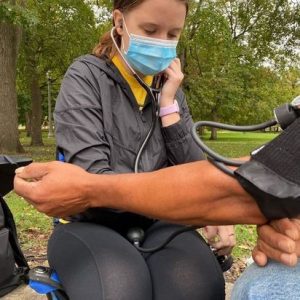
A Wolverine Street Medicine run in Detroit.
Like many issues in global public health, the negative effects of climate change are disproportionately being felt by more vulnerable populations. When taking the Homeless Healthcare elective, which is organized by the Wolverine Street Medicine student group, I had the unfortunate privilege of seeing the effects of climate change firsthand. Heavy rains made it impossible for people with lower extremity wounds to keep their legs dry on the street. High rates of COPD and asthma, partly attributable to city air quality, meant that needs for medicated inhalers were common (devices that have their own cost on the environment). Most life-threatening was the unseasonably cold weather during my rotation that caught many unhoused folks, even those with years of experience on the street, unprepared with sufficient supplies for staying warm. For these patients, worrying about the environment never stops; now coming into the warmer months they have to start thinking about how to stay cool and hydrated in humid summers. It is terribly difficult to live unhoused, and what we’re doing to the climate is not making it easier.
That humans are accelerating climate change is a fact that we’ve understood well for decades, and it’s something that I’ve known about since I was a kid. I remember that it was talked about in my 6th grade earth science class as global warming. I’m glad now that we recognize more is happening as a result of human activity than polar bears being stranded on melting ice flows. But the subject wasn’t anything I cared much about until it became a major part of my undergraduate education by accident; I wanted to study nutrition, and all of the food systems courses at my school were run through the department of environment.
My academic understanding of the issue was brought to reality when working in the urban agriculture scene in Detroit, where food sovereignty for communities was discussed as an assurance that they could provide for themselves knowing that their already-limited access to good food would be the first to go in the event of national food insecurity from climate change. Then it continued to be a theme in my graduate studies in public health, as I looked into understanding the interplay between our agricultural system, our nutrition and our climate. But when I started medical school, there was suddenly no talk about climate change. It was not a feature in the pre-clinical curriculum in areas where it clearly felt applicable. I learned of some more senior students who were engaged in individual projects that related to climate change and they had formed a little group that they used to vent about eco-anxiety and get feedback on their ideas.
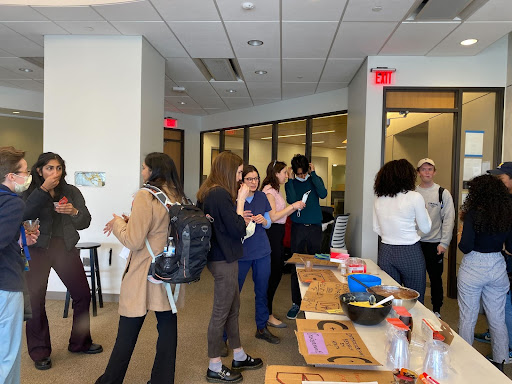
On Earth Day 2022, we announced the results of our Planetary Health Report Card and celebrated the planet with a vegan ‘Make-Your-Own Dirt Cup’ station.
Because of those students I was brought into a community of climate activists and have been able to make this a staple of my work today. I am a DOW Sustainability Fellow, the Co-Chair for Plant-Based Health with the Medical Students for a Sustainable Future and co-director of the White Coats for Planetary Health (WCPH), the organization born out of that small group of students that now organizes advocacy efforts for the elevation of climate change themes in all areas of UMMS’s functioning. Last summer, I was part of a group of students who presented to the academic cabinet about the need for more investment in climate change topics at our school, pointing to the report from the President’s Commission on Carbon Neutrality that was coming out with carbon production reduction mandates for the university.
In that presentation we discussed the need to comprehensively understand the school’s relationship with climate change and proposed that the school facilitate students completing the Planetary Health Report Card (PHRC). This is a tool developed for students to use to audit their medical school and how it engages with climate change in five different domains: Curriculum, Research, Community Engagement, Student Support and Operations. To date, 74 medical schools around the globe have participated in the international initiative.
Because of faculty support and passionate students, the WCPH were able to complete the PHRC for the first time this past year; UMMS scored a C+ with large areas to improve upon in how the school engages in climate teaching its core curriculum and how it engages on the topic with the local community and global academic movements. U-M is used to being the ‘Leaders and Best,’ and while a C+ is hardly a score to brag about, we now clearly know areas where our school can improve, and I feel the motivation to act from folks in all corners of University of Michigan Medical School.
I am immensely proud of WCPH and everything that we have been able to accomplish this past year.
- We’ve hosted events in the Global Health and Disparities Path to share local environmental issues and connect climate change to different areas of medical practice.
- We also improved upon the Planetary Health elective that our members put on in January to bring climate experts from around the country to run workshops with our students and outline actionable ways to get involved in climate advocacy.
- We spurred the creation of a committee of school administrators that makes decisions toward achieving carbon neutrality at the Medical School. That represents the first committee at an individual school at the University of Michigan to address the topic, and WCPH has guaranteed permanent representation on it.
I am most proud of my student peers and how dedicated they are to this mission. It is reassuring to see more people each year coming into UMMS wanting to be involved in this area and make it a focus of their work outside of patient care.
If you’re a student and interested in learning more about climate advocacy here at UMMS, please reach out to WCPH at wcph-leadership@umich.edu. We would love to get you involved, and if you have an idea for a project we would love to help in any way.
To learn more about virtual opportunities and movements around the country, please join MS4SF. And if you’re a professional, please use your influence in your department to do some introspection. Every field contributes to the climate change problem, which means every field can contribute to creating solutions.
by Daniella Ortiz | May 5, 2022
I’ve had the pleasure to be involved with M-Home since my first weeks at University of Michigan Medical School, and it has truly shaped so much of my medical school experience. In those first weeks, we had an opportunity to run for student council positions, and I was surprised to find myself elected to an M-Home representative role.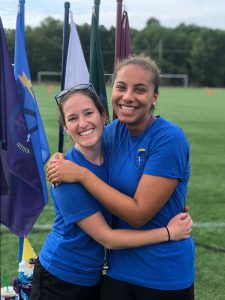
It was overwhelming at first because I had little idea about what the role entailed or what M-Home was, given that it was pretty new to our medical school. But I would soon find out that M-Home would provide me with a community that helped to sustain me through the highs and lows of my medical school journey.
What is M-Home?
M-Home is a longitudinal learning community established at University of Michigan Medical School in 2015 as a way to provide a “home” for students within our school. M-Home is based around four Houses now named after significant figures in UMMS history: Dr. Amanda Sanford, Dr. Jonas Salk, Dr. William Henry Fitzbutler, and Dr. Alice Hamilton. Within each House there is a designated counselor, as well as two House faculty who serve as faculty for our Doctoring course. As part of orientation to UMMS, each student is sorted (yes, it’s very Harry Potter-esque) into their House in which they will have their Doctoring group of 10-12 students from their House.
I remember sitting in a large lecture hall in Fall of 2018 waiting to crack my glowstick that had been passed out to me as part of my class’s “sorting ceremony.” The lecture hall filled with laughs, cheers and excitement as we all cracked our glowsticks to see which House we were about to join. When I saw the color blue and knew I was joining Sanford House, I felt like I had a group of people I was instantly connected to, even though I had met very few of my classmates or faculty at that point.
I felt so moved and comforted in that first week being welcomed by our Sanford House reps and by our amazing counselor Amy. I wanted to be involved in leading the community, which led me to add my name to the running for M1 Sanford House rep. When I got the role, I found an even deeper connection to the House reps above me. My relationships with my M2, M3 and M4 reps created invaluable opportunities to receive advice and support for me as an M1. Being able to connect with other House reps has continued to be one of my favorite aspects of M-Home for the past four years.
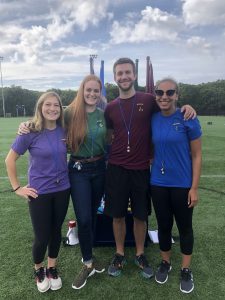
My fellow M-Home House reps
Introducing M-Pods
As M-Home president, I have been involved in conversations on how we can bring the deep inter-class community that we feel as M-Home reps to the rest of our Medical School classmates, especially in the very isolating times of the COVID-19 pandemic. In my last weeks as a UMMS student I am helping to launch our new M-Pods program, which I envision as a connection “safety-net” for all medical students. We will be creating small groups with students from every class with the goal of giving every incoming student a contact to reach out to if they find themselves needing support or a simple piece of advice that they don’t already have the connections for.
I personally know how hard it can be to make the first move to reach out for help, and I am hopeful that our M-Pods project will make it easier for any medical student who struggles to connect. As I pass along this project to the rest of our amazing M-Home team to continue after my graduation, I hope that my efforts will create a deeper and more connected community for all University of Michigan Medical School students in the years to come.
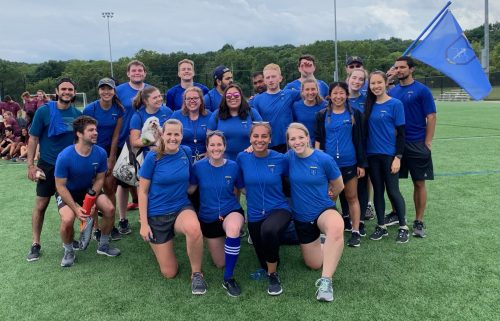
M-Home Olympics: A fun, annual event that creates some friendly competition among the four Houses. Go Sanford House!













